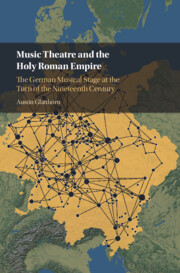 Music Theatre and the Holy Roman Empire
Music Theatre and the Holy Roman Empire Published online by Cambridge University Press: 14 June 2022
Based on a distant reading of key periodicals, this chapter investigates the music and musicians that received the most contemporary attention – and how recognition developed – throughout the era. It demonstrates in the first instance that the Reich had its own practical repertoire that transcended any one area, national tradition, or group of composers. Contemporaries often referenced musical titles without identifying a composer despite the fact that works could circulate in multiple versions by a single musician, in various settings by different composers, and as adapted texts by dramatists and musicians. But evidence suggests that the years around 1785 marked a moment of increasing normalization during which topics already set to music would be generally avoided and pieces circulating in multiple settings were increasingly linked to the work of just one composer. Establishing which music and musicians received the most attention, their relative importance to one another, and how associations between them altered in time, this chapter demonstrates that the Reich cultivated a shared repertoire that was formed and informed by networks of information and communication.
To save this book to your Kindle, first ensure no-reply@cambridge.org is added to your Approved Personal Document E-mail List under your Personal Document Settings on the Manage Your Content and Devices page of your Amazon account. Then enter the ‘name’ part of your Kindle email address below. Find out more about saving to your Kindle.
Note you can select to save to either the @free.kindle.com or @kindle.com variations. ‘@free.kindle.com’ emails are free but can only be saved to your device when it is connected to wi-fi. ‘@kindle.com’ emails can be delivered even when you are not connected to wi-fi, but note that service fees apply.
Find out more about the Kindle Personal Document Service.
To save content items to your account, please confirm that you agree to abide by our usage policies. If this is the first time you use this feature, you will be asked to authorise Cambridge Core to connect with your account. Find out more about saving content to Dropbox.
To save content items to your account, please confirm that you agree to abide by our usage policies. If this is the first time you use this feature, you will be asked to authorise Cambridge Core to connect with your account. Find out more about saving content to Google Drive.